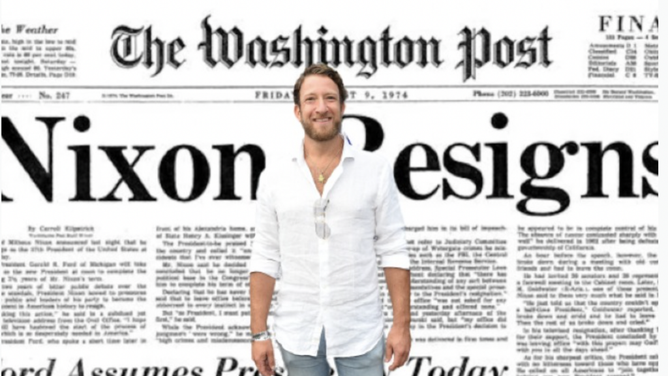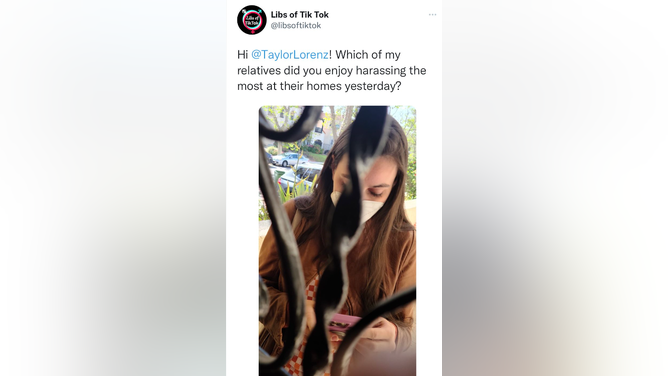Washington Post Failed Smear Campaign Against Dave Portnoy Emblematic Of Legacy Media Decline: Burack
The Washington Post has published articles since 1877. And has been one of the most influential journalism outfits in the country since.
Only a finite number of newsrooms worldwide have commanded the same level of esteem.
Politicians have long feared the Post's ability to disfigure American politics. The outlet famously spearheaded the Watergate scandal from 1972 to 1974, arguably the most profound series of reporting to date.
That was then.
Last week, Post reporter Emily Heil published a hit piece on Barstool's One Bite Pizza Festival. Heil contacted and pressured advertisers to pull out of the event over her hypothesis that company founder Dave Portnoy is a misogynistic racist.
Historically, sponsors would have acquiesced to the outlet's not-so-subtle commands to cease association with Portnoy. The almighty Washington Post would have squashed the still relatively niche Barstool brand.
But that did not happen. In fact, not a single brand dropped its sponsorship of Pizzafest on Saturday. The Washington Post's efforts to run tortious interference against Portnoy proved moot.
The sequence suggests the legacy media's influence over corporate decision-making has waned precipitously.
Brands no longer fear the press. And the public no longer trusts it.

A Fortune study earlier this year discovered that faith in the media sits at an all-time low.
Half of Americans believe that news organizations deliberately mislead them. Only 23% of respondents say journalists act in the public's best interests.
A Gallup poll found that only 15% of American adults trust newspapers. Congress is the only institution that Americans trust less than the press.
The legacy media used to possess a golden gun to take out any target on whom it fixated. Today, targets of the media more often than not benefit from said takedown efforts.
There's no better example of that phenomenon than the Libs of TikTok X account, a conservative influencer who repurposes videos of wacky liberals while in their natural habitats.
In April 2022, Washington Post tech "reporter" Taylor Lorenz, one of the nastiest women on the internet, doxxed and harassed the then-anonymous creator of the account, Chaya Raichik. Lorenz showed up at the homes of the creator's relatives, where she pressured them to divulge information about Raichik.
With her mask, of course:

Lorenz tried to invalidate the account and frame Raichik as a homophobic bigot.
Lorenz failed.
Libs of TikTok gained over 300,000 followers 24 hours after the publication of Lorenz's filth of an article.
The account has since amassed over 2.5 million followers on X, while Lorenz has become a caricature of the self-entitled, mentally unstable corporate journalist. She fits the role well.
The Washington Post's ability to turn the public against the likes of Raichik and Pornoty is no more.
The intuitive and sharp-witted used to consume established newsrooms. They've been replaced by the dense and ignorant.
Last summer, Bill Maher astutely mocked what has become of the Washington Post:
“If someone named Deep Throat called today and wanted to meet, this crew of emotional hemophiliacs would have an anxiety attack and report to HR they didn’t feel safe."
Deep Throat would have most certainly worsened Emily Heil's case of anxiety. And whatever is wrong with Lorenz.
The deteriorating state of the legacy media is the culmination of decades of deceit, half-truths, deceptively edited quotes, and promulgations of one-sided political lingo.
The coverage of the past two elections and the Covid-19 pandemic exacerbated those concerns.
Dishonesty turns villains into heroes.
The Washington Post didn't expose Portnoy as a misogynist as planned. The Washington Post exposed itself as a room of unethical roaches after admitting on the phone with Dave that it intentionally misled advertisers to cue a response.
The press doesn't define the enemy. It is the enemy.
"Democracy Dies in Darkness" is the official slogan of the Washington Post. But the outlet no longer wields the credibility to define the "Darkness."